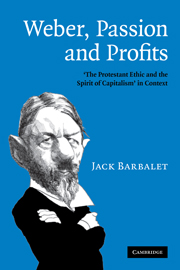Book contents
- Frontmatter
- Contents
- List of figures
- Acknowledgements
- Note on citations
- Introduction
- 1 From the inaugural lecture to the Protestant Ethic: political education and German futures
- 2 From the Protestant Ethic to the vocation lectures: Beruf, rationality and emotion
- 3 Passions and profits: the emotional origins of capitalism in seventeenth-century England
- 4 Protestant virtues and deferred gratification: Max Weber and Adam Smith on the spirit of capitalism
- 5 Ideal-type, institutional and evolutionary analyses of the origins of capitalism: Max Weber and Thorstein Veblen
- 6 The Jewish question: religious doctrine and sociological method
- Conclusion
- References
- Index
2 - From the Protestant Ethic to the vocation lectures: Beruf, rationality and emotion
Published online by Cambridge University Press: 22 September 2009
- Frontmatter
- Contents
- List of figures
- Acknowledgements
- Note on citations
- Introduction
- 1 From the inaugural lecture to the Protestant Ethic: political education and German futures
- 2 From the Protestant Ethic to the vocation lectures: Beruf, rationality and emotion
- 3 Passions and profits: the emotional origins of capitalism in seventeenth-century England
- 4 Protestant virtues and deferred gratification: Max Weber and Adam Smith on the spirit of capitalism
- 5 Ideal-type, institutional and evolutionary analyses of the origins of capitalism: Max Weber and Thorstein Veblen
- 6 The Jewish question: religious doctrine and sociological method
- Conclusion
- References
- Index
Summary
In the Protestant Ethic the concept of Beruf, variously translated as ‘calling’ or ‘vocation’, refers to the practice of systematic self-control in pursuing constant goals or purposes, which Weber found in both Calvinist religious practice and capitalistic entrepreneurship and labour. But the term is not confined to only these applications. As we saw in the previous chapter, it is key to Weber's discussion of political maturity in the inaugural lecture of 1895 (Weber 1895a: 20, 23, 26). But in that work it remains underdeveloped and indeed gives rise to the need for Weber to explore and elaborate the notion further, which he does in the Protestant Ethic. The concept is also central in the so-called vocation lectures, ‘Science as a Vocation’ and ‘Politics as a Vocation’, written and delivered in late 1917 and early 1919 respectively (see Schluchter 1996: 9, 46–7). The general significance of the idea of Beruf as set out in the Protestant Ethic and subsequent work is that it accounts for the mechanisms required to realize in action the quality of rationality, another of Weber's characteristic terms. The connection between rational activity and calling is constant in Weber's discussion at least from the Protestant Ethic. In his statement of the argument in this work, however, practices of Beruf achieve rationality through the suppression of emotion. In his later discussion, Beruf is achieved through and expresses passion and emotions.
- Type
- Chapter
- Information
- Weber, Passion and Profits'The Protestant Ethic and the Spirit of Capitalism' in Context, pp. 46 - 74Publisher: Cambridge University PressPrint publication year: 2008



